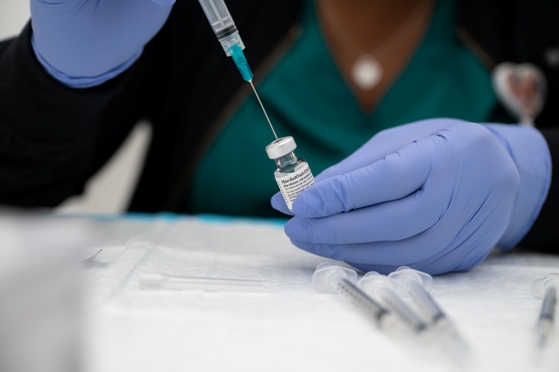FDA grants full approval to Pfizer-BioNTech vaccine

By Sharon Lafraniere and Noah Weiland
WASHINGTON – The Food and Drug Administration on Monday (23) granted full approval to Pfizer-BioNTech’s coronavirus vaccine for people 16 and older, making it the first to move beyond emergency use status in the United States.
The decision will set off a cascade of vaccine requirements by hospitals, colleges, corporations and other organizations. United Airlines recently announced that its employees will be required to show proof of vaccination within five weeks of regulatory approval.
Oregon has adopted a similar requirement for all state workers, as have a host of universities in states from Louisiana to Minnesota. The Pentagon has said it would mandate the shots for the country’s 1.3 million active-duty troops once the Pfizer approval came through.
The approval comes as the nation’s fight against the pandemic has intensified again, with the highly infectious Delta variant dramatically slowing the progress
the country had made over the first half of the year. The Biden administration hopes the development will motivate at least some of the roughly 85 million unvaccinated Americans who are eligible for shots to get them.
President Joe Biden was planning to commemorate it in a speech Monday urging vaccination.
“If you’re not vaccinated yet, now is the time,” the president said on Twitter.
“While millions of people have already safely received COVID-19 vaccines, we recognize that for some, the FDA approval of a vaccine may now instil additional confidence to get vaccinated,” Dr. Janet Woodcock, the acting FDA commissioner, said in a statement. “Today’s milestone puts us one step closer to altering the course of this pandemic in the US”
Pfizer said it presented the FDA with data from 44,000 clinical trial participants in the United States, the European Union, Turkey, South Africa and South America. The company said the data showed the vaccine was 91% effective in preventing infection — a slight drop from the 95% efficacy rate that the data showed when the FDA decided to authorize the vaccine for emergency use in December. Pfizer said the decrease reflected the fact that researchers had more time to catch people who became infected.
A recent poll by the Kaiser Family Foundation, which has been tracking public attitudes during the pandemic, found that 3 of every 10 unvaccinated people said that they would be more likely to get vaccinated with a shot that had been fully approved.
The Pfizer-BioNTech vaccine will continue to be authorized for emergency use for children ages 12-15 while Pfizer collects the necessary data required for full approval. A decision on whether to authorize the vaccine for children younger than 12 could be at least several months away. So far, more than 92 million Americans — 54% of those fully inoculated — have gotten Pfizer shots. Most of the rest received Moderna’s vaccine.
Dr. Peter Marks, the FDA’s top vaccine regulator, said the Pfizer vaccine’s licensure followed a rigorous review of hundreds of thousands of pages of data and included inspections of the factories where the vaccine is produced.
“The public and the medical community can be confident that although we approved this vaccine expeditiously, it was fully in keeping with our existing high standards for vaccines in the U.S.,” he said.
Health experts and state officials welcomed the development. With the delta variant driving up caseloads across the country, “full approval could not come at a more important time,” said Dr. Richard Besser, president of the Robert Wood Foundation and former acting director of the Centres for Disease Control and Prevention.
“It is time for schools, businesses, health care facilities, and other indoor places where people congregate to mandate COVID-19 vaccines for admittance for all who are vaccine-eligible,” he said.
Some experts have estimated that full approval might convince just 5% of those who are unvaccinated to get shots. Even if that’s so, “that’s still a huge slice of people,” Dr. Thomas Dobbs, the chief health officer for Mississippi, a state that is particularly hard hit by the delta variant. He said licensure will help “shake loose this false assertion that the vaccines are an ‘experimental’ thing.”
The FDA is in the midst of a decision-making marathon related to coronavirus vaccines. The next major one looming for regulators is whether to authorize booster shots. The Biden administration said last week that pending the agency’s clearance, it will offer third shots to adults who got the Pfizer and Moderna vaccines eight months after their second injection, starting Sept. 20. Third shots are already authorized for some people with immune deficiencies, but the risk-benefit calculus is different for the general population.
Federal health officials said that both Pfizer-BioNTech and Moderna’s vaccines, which rely on similar technology, wane in potency over time. That trend, they said, is converging with the rise of the particularly dangerous Delta variant, making those who completed their vaccinations at the start of the year increasingly vulnerable to infection.
Some health experts have challenged the decision to recommend booster shots as premature, saying the data shows that the vaccines are holding up well against severe disease and hospitalization, including against the delta variant. Boosters would only be warranted if the vaccines were failing to prevent hospitalizations with COVID-19, some of those experts have said.
Regulators are still reviewing Moderna’s application for full approval of its vaccine. That decision could take several weeks. Johnson & Johnson is expected to apply soon for full approval.
-New York Times

